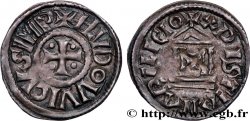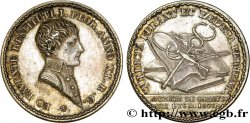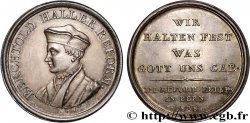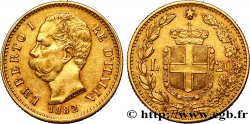Назад 1/1
fme_972048 - III REPUBLIC Médaille, Clémenceau et l’UMFIA
60.00 €
Количество
Добавить в корзину

Тип Médaille, Clémenceau et l’UMFIA
Дата: 1933
Монетный двор / Город: 75 - Paris
Металл: bronze
Диаметр: 68,5 mm
Ориентация осей монеты: 12 h.
Гравер VILLANDRE Charles
Вес: 144,03 g.
Век: lisse + V. CANALE + triangle
Пуансон: Triangle
Комментарии о состоянии
Patine hétérogène avec des taches d’oxydation. Légère usure
Лицевая сторона
Аверс: легенда: CLEMENCEAU DOCTEUR EN MÉDECINE MAI 1865.
Аверс: описание: Tête de Clémenceau à droite. Signé : VILLANDRE .
Обратная сторона
Реверс: легенда: MÉDAILLE COMMÉMORATIVE / JUBILE MÉDICAL // PRÉSIDENT D’HONNEUR FONDATEUR / DE L’ / UMFIA / 11 NOVEMBRE 1933.
Реверс: Описание: Lampe antique posée sur des cartouches contenant 5 lignes de légendes.
Комментарий
Georges Benjamin Clemenceau, né le 28 septembre 1841 à Mouilleron-en-Pareds (Vendée) et mort le 24 novembre 1929 à Paris, est un homme d'État français, radical-socialiste, président du Conseil de 1906 à 1909, puis de 1917 à 1920.
Fils de médecin et médecin lui-même, il est maire du 18e arrondissement de Paris puis président du conseil municipal de Paris au début de la Troisième République, ainsi que député en 1871 et de 1876 à 1893, siégeant en tant que républicain radical. Défenseur de l'amnistie pour les Communards, et anticlérical, il prône la séparation des Églises et de l'État et s'oppose à la colonisation, faisant tomber le gouvernement Jules Ferry sur cette question. Fondateur du journal La Justice et de la Société des droits de l'homme et du citoyen, il travaille ensuite à L'Aurore et prend une part active dans la défense du capitaine Dreyfus. Il ne cessa de militer en faveur de la restitution de l'Alsace-Moselle, perdues à la suite de la défaite de 1871.
Georges Benjamin Clemenceau, born September 28, 1841 in Mouilleron-en-Pareds (Vendée) and died November 24, 1929 in Paris, was a French statesman, radical socialist, President of the Council from 1906 to 1909, then from 1917 to 1920. Son of a doctor and a doctor himself, he was mayor of the 18th arrondissement of Paris then president of the Paris municipal council at the beginning of the Third Republic, as well as deputy in 1871 and from 1876 to 1893, sitting as a radical republican. Defender of amnesty for the Communards, and anticlerical, he advocated the separation of Church and State and opposed colonization, bringing down the Jules Ferry government on this issue. Founder of the newspaper La Justice and of the Society for the Rights of Man and Citizen, he then worked at L'Aurore and took an active part in the defense of Captain Dreyfus. He never stopped campaigning for the restitution of Alsace-Moselle, lost following the defeat of 1871.
Fils de médecin et médecin lui-même, il est maire du 18e arrondissement de Paris puis président du conseil municipal de Paris au début de la Troisième République, ainsi que député en 1871 et de 1876 à 1893, siégeant en tant que républicain radical. Défenseur de l'amnistie pour les Communards, et anticlérical, il prône la séparation des Églises et de l'État et s'oppose à la colonisation, faisant tomber le gouvernement Jules Ferry sur cette question. Fondateur du journal La Justice et de la Société des droits de l'homme et du citoyen, il travaille ensuite à L'Aurore et prend une part active dans la défense du capitaine Dreyfus. Il ne cessa de militer en faveur de la restitution de l'Alsace-Moselle, perdues à la suite de la défaite de 1871.
Georges Benjamin Clemenceau, born September 28, 1841 in Mouilleron-en-Pareds (Vendée) and died November 24, 1929 in Paris, was a French statesman, radical socialist, President of the Council from 1906 to 1909, then from 1917 to 1920. Son of a doctor and a doctor himself, he was mayor of the 18th arrondissement of Paris then president of the Paris municipal council at the beginning of the Third Republic, as well as deputy in 1871 and from 1876 to 1893, sitting as a radical republican. Defender of amnesty for the Communards, and anticlerical, he advocated the separation of Church and State and opposed colonization, bringing down the Jules Ferry government on this issue. Founder of the newspaper La Justice and of the Society for the Rights of Man and Citizen, he then worked at L'Aurore and took an active part in the defense of Captain Dreyfus. He never stopped campaigning for the restitution of Alsace-Moselle, lost following the defeat of 1871.








 Cообщить об ошибке
Cообщить об ошибке Распечатать страницу
Распечатать страницу Отправить мой выбор
Отправить мой выбор Задать вопрос
Задать вопрос Consign / sell
Consign / sell
 Информация
Информация















